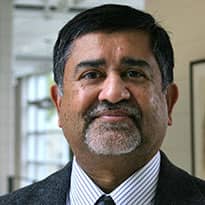I met U(ppaluri) G(opala) Krishnamurti in Suguna and Chandrashekhar's home in Bangalore in 1983. I did not then know the name of the hosts, Suguna and Chandrashekhar, and I do not remember much of what UG (as he was known to his "followers" and the cognoscenti) said that evening. I was a young, confused man, having then recently quit as an officer in a public sector bank in India, and having joined the Valley School (a J. Krishnamurti Foundation school in Bangalore, India) as a teacher. My colleague and friend who had grown up in Bangalore, and who had a better network of friends, teachers, and philosophers to guide him, had heard that UG was in town, and asked me to accompany him.
I was not sure about going to some stranger's house uninvited, and meeting someone about whom I knew little except by way of some overheard snippets of conversation between my more senior colleagues in the school. Anyway, I went, and met the then still handsome man—who looked neither Indian nor European, was silver-haired, with skin the tone of a Kashmiri or an Afghan, grey eyes that looked into yours but seemed far away, and who was uneasily quiet or vaguely cryptic but who did not seem either dismissive or careworn. I remember that there were very few others at the house that evening, and it was my more loquacious friend who tried to get some conversation going. One of the guests that evening was Dr. M. C. Modi, a famous eye-surgeon in Bangalore, who after a few minutes of trying to make sense of the conversation left quietly, realizing that his time spent self-consciously in front of UG was time away from his more urgent chores bringing some light into people's lives.
That evening, I was given a mimeographed copy of UG's interviews and commentary, collected and transcribed by his faithful, Western students or followers or whatever they called themselves. I held on to the light-blue covered booklet, printed on flimsy India-manufactured paper, because UG's utterances were strangely hypnotic to me—confused, cynical, and hopeful as I was then—and because they could serve later as a reference work that I could go back to when writing about J. Krishnamurti or about other Indian mystics, saints, savants, and charlatans. Alas, that booklet, given to a student in a fit of generosity, was never returned, and I lost track of the one I had given it to.
Thirty years after that meeting, I came to read Louis Brawley'sGoner: The Final Travels of UG Krishnamurti, which, as someone astutely noted, is like a train-wreck from which you cannot take your gaze! The UG I discovered in Goner comes across as a very different man than the one I met in 1983: he is at once impish and controlling, abusive and loving, madman and charlatan, tired and garrulous, and has hangers on from around the world in what seems a carnival of buffoons, wastrels, vagabonds, and the wealthy and disenchanted. There is Mahesh Bhatt, the Indian film director, who comes across as the pragmatic, no-nonsense, well-heeled man rescuing Brawley, the lost, confused, bored, and desperate young man in search of wisdom. There is "Yogini," the daughter of a rich man, a ballet dancer, beautiful, tempting, and juggling a few lovers. And there is Ray and his wife Shannon, who run a new age church in the American Midwest, and who spend enormous sums of money to go see UG wherever he is, and who are driven to the edge of despair as UG gives Ray ("The Reverend") the hives with confusing and conflicting commands and driving directions on their long road trips across Europe.
Brawley meets UG in New York City in 2002, and for the next five years trails and travels with him in Europe and in India, learning along the way that thought is debilitating, that it is difficult to not think, that lessons cannot be taught and cannot be learned, that it is not all nihilistic but it seems so if you think about it, and so on, in what seems to be a five-year long "apprenticeship" that could as well be a script for Beckett's new version of Waiting for Godot with the subtitle "A Madcap Adventure." Brawley stays around till UG dies quietly and is cremated unceremoniously in Switzerland in 2007.
What enlivens Brawley's masochistic journey across the world are UG's asides and commentaries on life and people. For example, UG says this about Gandhi: "That bastard Gandhi was the worst thing that ever happened to India. I don't even want to touch the Indian Rupees. Why they have to put his filthy picture on every note.... If he were here right now I would kick him in his pants. I said to his face when I met him: 'One day they will put a teeny veenie bullet in you and that will be the end of you'" (p. 33). And about (Jawaharlal) Nehru: "Then that Nehru went in for partition because he was sleeping with Mountbatten's wife Edwina. That bitch talked him into it. She was a real bitch" (p. 33). Or about his once guru and friend, the more famous Jiddu Krishnamurti, "... He tried to hug me! I didn't ask him at that time but now I would have said to him, 'Krishnaji, do you have any homosexual tendencies?' Can you imagine? That bastard'" (p. 41). Or, "India is a spiritual shitland and it should be wiped out for what it has done to this planet" (p. 66), and "America should be wiped out too, but do you mean to say they are going to go gracefully? Not a chance! Unfortunately they will take with them every form of life on this planet!" (p. 66).





